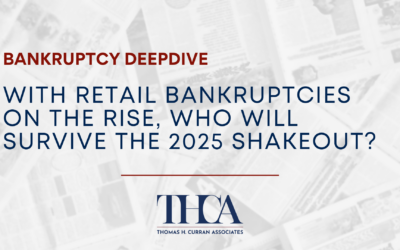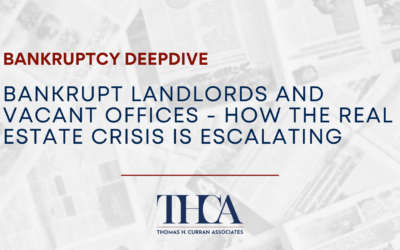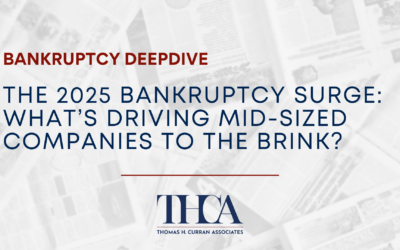Chapter 11 Personal Bankruptcy Attorney
While Chapter 11 bankruptcy is most often thought of as a form of business bankruptcy, there are situations where some of the special provisions included in Chapter 11 can help individuals reorganize their debt. This is often used when the debtor does not qualify for Chapter 13 bankruptcy, which is the option most often chosen by individuals seeking to reorganize their affairs in bankruptcy.
Both Chapter 11 and Chapter 13 bankruptcy can protect individuals from their creditors while they reorganize or restructure their debts to make them more manageable and reduce the amounts owed to creditors. But Chapter 13 bankruptcy is only available to debtors with regular incomes who have less than $419,175 in unsecured debt and less than $1,257,850 in secured debt. Secured debts are obligations where the creditor holds an interest in collateral held by the debtor, such as a lien, while unsecured debts do not involve collateral.
In a personal Chapter 11 bankruptcy, there is no cap on the amount of secured or unsecured debt a debtor may owe and there is no requirement that the debtor earn any income at all. Because of this, an individual Chapter 11 bankruptcy is likely to benefit individuals who owe large amounts of money to creditors or have little or no income but possess assets that may be sold to fund a Chapter 11 reorganization plan.
One of the benefits of a Chapter 13 bankruptcy over a Chapter 11 proceeding is that the debtors may continue using their existing bank accounts and are not required to file monthly operating reports. In most individual Chapter 11 bankruptcies the debtor must close all of his or her bank accounts and open new bank accounts as the debtor-in-possession for transactions related to the bankruptcy estate. Additionally, individual Chapter 11 debtors are required to file monthly operating reports that detail their income and expenditures.
The filing of either a Chapter 11 or Chapter 13 petition by a debtor will result in the Bankruptcy Court issuing an automatic stay that stops creditors from trying to collect their debts and most other judicial proceedings. But only Chapter 13 proceedings apply the stay to co-debtors who are also responsible for paying the debtor’s loans.
Another advantage of filing for personal Chapter 11 bankruptcy is that no bankruptcy trustee will be appointed except in cases where there is fraud or mismanagement. This allows the debtor to continue managing his or her affairs. But there are limits as to what the debtor may do. As the debtor-in-possession, the debtor has a fiduciary duty to operate the bankruptcy estate for the benefit of creditors.
Some aspects of the personal Chapter 11 bankruptcy will be overseen by the U.S. Trustee’s Office, but the trustee may play a less significant role than that of a trustee appointed for a Chapter 13 bankruptcy. The Chapter 11 trustee will usually conduct an initial debtor interview outlining the administrative requirements of a Chapter 11 case and a trial attorney from the U.S. Trustee’s Office will often conduct the required meeting of the creditors.
There is no income requirement for an individual Chapter 11 bankruptcy, but the debtor must complete a means test to calculate his or her monthly income by filling out a two-page form.
After filing the personal Chapter 11 petition, there is no deadline for when the debtor must file a reorganization plan and creditor payments will not begin until the plan is confirmed by the court. This can often take several months or longer. The debtor is required to file a disclosure statement along with the reorganization plan. The disclosure statement should contain the information necessary for the creditors to properly evaluate the viability of the reorganization plan.
A Chapter 11 plan must group similar types of debt into classes that will be paid in the same manner. It is not unusual for a class to contain only one creditor. Those classes that would receive less than full payment under the plan are known as “impaired” classes. For the Bankruptcy Court to approve a Chapter 11 reorganization, the plan must be approved by at least one-half of the creditors in an impaired class who also hold two-thirds of the debt in their class.
In a personal Chapter 11 case the Bankruptcy Court will grant a discharge of the debtor’s remaining unsecured debts after he or she has completed payment under the reorganization plan. The debtor will no longer be responsible for the debt that has been discharged, except as provided for in the Chapter 11 plan.
The experienced bankruptcy attorneys at Thomas H. Curran Associates can help individuals who are trying to decide whether Chapter 11 or Chapter 13 bankruptcy would be best for their situation. Our attorneys have worked on all types of bankruptcies and can give their clients meaningful guidance on how best to proceed in their personal bankruptcy. Once bankruptcy has been filed, our attorneys can assist the debtors in managing their case to ensure it is resolved in the most efficient manner possible without depriving them of their assets.
Bankruptcy Practice Results
Recent successful cases handled by the attorneys from Thomas H. Curran Associates. Find more here »
Supreme Court Denies Final Appeal, Finalizing Judgement Obtained by THCA
On June 24, 2024, the Supreme Court of the United States declined the petition to review filed by Sean Dunne and his ex-wife Gayle...
Thomas H. Curran Associates Secures Appellate Victory as Massachusetts Supreme Judicial Court Denies Appellant’s Attempt to Shortcut Ordinary Appellate Review
Thomas H. Curran Associates recently obtained an appellate victory in the Massachusetts Supreme Judicial Court on May 26, 2023, in the...
Thomas H. Curran Associates win is Affirmed in Florida, U.S. District Court – Client Wins Attorneys Fees
Law: Federal Rule of Civil Procedure 37(a)(5) Case: Premier Capital, LLC v. Larry Bryan (AP) Underlying Bankruptcy Case: In re Larry Bryan...
The Second Circuit Affirms Bankruptcy Fraud Judgment Obtained by Thomas H. Curran Associates, Recognizing the Continuous Concealment Doctrine
Law: Continuous concealment doctrine, 11 USC § 727(a)(2)(A), In re Olivier, 819 F.2d 550 (5th Cir. 1987); In re Boyer, 328 F. App’x 711,...
Thomas H. Curran Associates prevails on barring discharge due to fraud by debtor
Thomas H. Curran Associates recently secured a victory on behalf of an institutional asset manager, where the Bankruptcy Court for the...
Thomas H. Curran Associates prevails on post-trial motions and obtains full security for $23 million dollar financial fraud judgment on behalf of chapter 7 bankruptcy trustee
On February 8, 2022, the United States District Court for the District of Connecticut (Meyer, J.) enter its Order denying defendant Gayle...
Supreme Court Denies Final Appeal, Finalizing Judgement Obtained by THCA
On June 24, 2024, the Supreme Court of the United States declined the petition to review filed by Sean Dunne and his ex-wife Gayle...
Thomas H. Curran Associates Secures Appellate Victory as Massachusetts Supreme Judicial Court Denies Appellant’s Attempt to Shortcut Ordinary Appellate Review
Thomas H. Curran Associates recently obtained an appellate victory in the Massachusetts Supreme Judicial Court on May 26, 2023, in the...
Thomas H. Curran Associates win is Affirmed in Florida, U.S. District Court – Client Wins Attorneys Fees
Law: Federal Rule of Civil Procedure 37(a)(5) Case: Premier Capital, LLC v. Larry Bryan (AP) Underlying Bankruptcy Case: In re Larry Bryan...
The Second Circuit Affirms Bankruptcy Fraud Judgment Obtained by Thomas H. Curran Associates, Recognizing the Continuous Concealment Doctrine
Law: Continuous concealment doctrine, 11 USC § 727(a)(2)(A), In re Olivier, 819 F.2d 550 (5th Cir. 1987); In re Boyer, 328 F. App’x 711,...
Supreme Court Denies Final Appeal, Finalizing Judgement Obtained by THCA
On June 24, 2024, the Supreme Court of the United States declined the petition to review filed by Sean Dunne and his ex-wife Gayle...
Thomas H. Curran Associates Secures Appellate Victory as Massachusetts Supreme Judicial Court Denies Appellant’s Attempt to Shortcut Ordinary Appellate Review
Thomas H. Curran Associates recently obtained an appellate victory in the Massachusetts Supreme Judicial Court on May 26, 2023, in the...
Thomas H. Curran Associates win is Affirmed in Florida, U.S. District Court – Client Wins Attorneys Fees
Law: Federal Rule of Civil Procedure 37(a)(5) Case: Premier Capital, LLC v. Larry Bryan (AP) Underlying Bankruptcy Case: In re Larry Bryan...
Bankruptcy Areas of Expertise
- Bankruptcy Litigation
- Bankruptcy Trustee Representation
- Avoidance & Recovery Actions
- Chapter 11 Trustees & Examiners
- Discharge Litigation
- Bankruptcy Fraud Investigations
- Cross Border Foreign Litigation
- 363 Bankruptcy Sales
- Bankruptcy Preference Actions
- Involuntary Bankruptcy
- Chapter 11/13 Plan Objections
Bankruptcy News
With retail bankruptcies on the rise, who will survive the 2025 shakeout?
Bankruptcies reached an unprecedented level in 2024, and the trend appears to be continuing into this year. Some notable major retailers...
Bankrupt landlords and vacant offices – How the real estate crisis is escalating
Following the pandemic, a significant transformation in the corporate work structure was inevitable, especially for professionals...
The 2025 bankruptcy surge: What’s driving mid-sized companies to the brink?
A mere two months have passed since the beginning of 2025 and chapter 11 bankruptcy filings are already steadily trending upwards compared...
Evidence of Intent to ‘Hinder’ Wasn’t Sufficient to Deny Discharge, District Judge Says
In the recent case Wylie v. Miller, 22-10952 (S.D. Mich. March 29, 2024) [1] , a bankruptcy court’s decision to deny a couple’s discharge...
Creditor’s Don’t Receive Estate Assets Recovered After the Last Chapter 13 Plan Payment
In In re McCrorey, 18-00696 (Bankr. D. Idaho Jan. 26, 2024) [1] , Chief Bankruptcy Judge Noah G. Hillen of Boise, Idaho, held that if a...
Electric Scooter Company Bird files for Bankruptcy | CNBC
Bird, the popular electric scooter rental company filed for Chapter 11 bankruptcy protection in Florida Federal Court last month. Bird's...
With retail bankruptcies on the rise, who will survive the 2025 shakeout?
Bankruptcies reached an unprecedented level in 2024, and the trend appears to be continuing into this year. Some notable major retailers...
Bankrupt landlords and vacant offices – How the real estate crisis is escalating
Following the pandemic, a significant transformation in the corporate work structure was inevitable, especially for professionals...
The 2025 bankruptcy surge: What’s driving mid-sized companies to the brink?
A mere two months have passed since the beginning of 2025 and chapter 11 bankruptcy filings are already steadily trending upwards compared...
Evidence of Intent to ‘Hinder’ Wasn’t Sufficient to Deny Discharge, District Judge Says
In the recent case Wylie v. Miller, 22-10952 (S.D. Mich. March 29, 2024) [1] , a bankruptcy court’s decision to deny a couple’s discharge...
With retail bankruptcies on the rise, who will survive the 2025 shakeout?
Bankruptcies reached an unprecedented level in 2024, and the trend appears to be continuing into this year. Some notable major retailers...
Bankrupt landlords and vacant offices – How the real estate crisis is escalating
Following the pandemic, a significant transformation in the corporate work structure was inevitable, especially for professionals...
The 2025 bankruptcy surge: What’s driving mid-sized companies to the brink?
A mere two months have passed since the beginning of 2025 and chapter 11 bankruptcy filings are already steadily trending upwards compared...
Contact Us
Are You In Need of Legal Counsel for a Bankruptcy Matter, Business Transaction, or Commercial Litigation?
Contact our team today.
Call us at (617) 207-8670 or use the quick contact form below.
Austin Office
7710 N. FM 620
Building 13-D
Austin, TX 78726
Boston Office
15 Broad Street
Suite 610
Boston, MA 02109
New York Office
17 State Street
40th Floor
New York, NY 10004
London Office
The Leadenhall Building
Level 30
122 Leadenhall Street
London EC3V 4AB
Tags: chapter 11 personal bankruptcy attorney personal bankruptcy chapter 11 filing personal bankruptcy chapter 11





